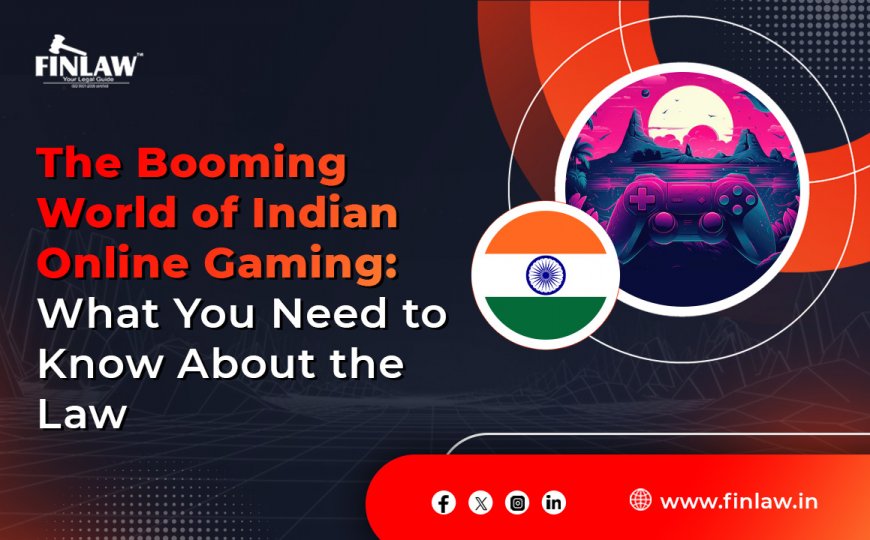The Booming World of Indian Online Gaming: What You Need to Know About the Law
Discover India’s growing online gaming scene, its legal complexities, and essential guidelines on skill-based gaming, betting laws, and player safety.

India's online gaming industry has experienced explosive growth in recent years, attracting millions of players and substantial investments. However, the legal landscape surrounding online gaming remains complex and often confusing, especially given the diverse legal frameworks across states. To navigate this evolving industry, it is essential to understand the legal nuances that govern online gaming in India.
The Legal Status of Online Gaming in India
The legality of online gaming in India is largely dictated by the Public Gambling Act of 1867, a law that was enacted long before the advent of online gaming. As a result, this legislation fails to address the complexities of the digital world, placing online gaming in a somewhat legal gray area. The distinction between "games of skill" and "games of chance" is critical under Indian law. Skill-based games are generally deemed legal, whereas games of chance are often classified as gambling, making them illegal.
Skill-Based Games: The Key to Legality
In India, skill-based games such as rummy, poker, and fantasy sports are widely accepted as legal and can acquire online gaming licenses because they involve a significant degree of strategy and expertise rather than relying purely on luck. Courts have consistently upheld that games requiring skill, judgment, and knowledge fall outside the purview of traditional gambling laws. However, it's important to note that these regulations can vary from one state to another. Some states have imposed restrictions or outright bans, making it essential to stay informed about local laws before participating in these games.
The Complexity of Online Betting
While skill-based games enjoy legal protection, online betting remains a tricky subject. Online betting, which typically involves sports betting, casino games, and online lotteries, is largely considered illegal in India. The existing legal framework does not differentiate between online and offline betting, meaning both forms are governed by the same prohibitive laws. As per Indian regulations, anyone caught engaging in online betting could face fines or imprisonment for up to three months. Despite these restrictions, the popularity of online betting continues to rise, which presents a challenge for lawmakers and regulators alike.
State-Specific Regulations: A Patchwork of Laws
One of the most challenging aspects of India's online gaming industry is the state-specific regulations that govern it. While the central government enforces broad gambling laws, each state has the authority to implement its own set of rules. For instance, Tamil Nadu, Andhra Pradesh, and Karnataka have introduced legislation banning online gaming. These restrictions often encompass a variety of game types, impose strict licensing requirements, and enforce age limits to protect younger audiences.
This fragmented legal landscape makes it difficult for operators and players to keep track of which games are legal and in which states they can be played. It also highlights the need for a more cohesive, nationwide regulatory framework that could address the unique challenges of online gaming.
Protecting Players in the Digital Age
As online gaming continues to grow in popularity, ensuring player protection has become a key priority. The best online gaming platforms are increasingly focusing on maintaining fairness, security, and transparency. Fraud prevention, responsible gaming initiatives, and dispute resolution mechanisms are being introduced to ensure that players can enjoy a safe and regulated gaming experience.
Additionally, measures like mandatory age verification, self-exclusion options, and limits on spending are being implemented to combat gambling addiction and other associated risks. These steps are essential in maintaining the long-term sustainability of the online gaming ecosystem in India.
The Importance of Legal Expertise
Given the complex and evolving nature of Indian online gaming laws, it is advisable for players and operators alike to seek professional legal counsel. Expert advice can help individuals and businesses navigate the intricate legal frameworks, ensuring compliance with both state and federal regulations. Legal professionals specializing in gaming law can offer insights on licensing requirements, consumer protection, and dispute resolution, making it easier to operate within the legal boundaries and avoid unnecessary penalties.
Conclusion
The online gaming industry in India is thriving, but its legal framework is still catching up with the rapid pace of technological advancement. Understanding the difference between skill-based games and betting, keeping up with state-specific regulations, and prioritizing player protection are all essential for ensuring a safe and legally compliant gaming experience. Whether you are an avid player or an online gaming operator, staying informed about the laws governing online gaming in India is crucial for safeguarding your interests.
What's Your Reaction?



















